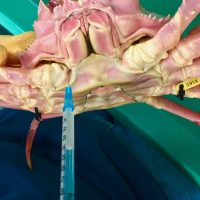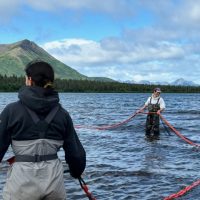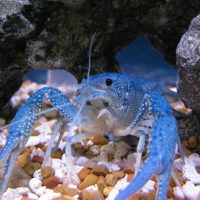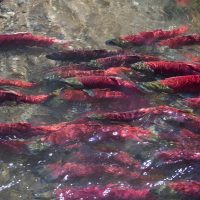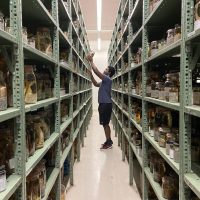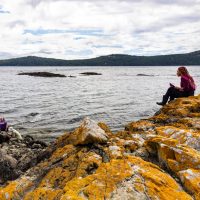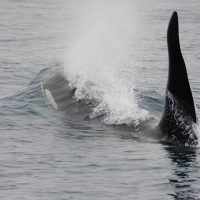Filter Results
Bitter crabs…attitude problem or parasitic infection?
Bitter crab syndrome might sound like an attitude problem, but it’s actually a condition faced by two very valuable fisheries in Alaska: snow crabs and Tanner crabs. So-called for the bitter flavor of crab meat in infected crabs, bitter crab syndrome (BCS) is caused by a parasitic dinoflagellate of the genus Hematodinium and infects a number of crustacean species around the globe. We spoke to SAFS grad student, Aspen Coyle, about her research.
Read moreCommunity and connection with the Alaska Salmon Program
It’s not all work while visiting the Alaska Salmon Program camps for the summer field season. Students head up to southwest Alaska, some for over three months, and downtime is a chance to explore, connect with their peers, and experience living in a field camp.
Read moreClicks not bricks: A global assessment of the online trade of ornamental crayfish
They may be small, but crayfish are mighty in other ways, one of them being invasive risk in areas where they are not natively found. Crayfish are increasingly being traded online for ornamental purposes, such as aquariums, and in a new study led by SAFS Professor Julian Olden, the first ever global assessment of the online trade in and associated invasion risk of freshwater crayfishes was conducted.
Read moreReflections on Tribal Fisheries and Co-Management 50 years after the Boldt Decision: Bevan Symposium
SAFS annually hosts the “Bevan Seminar on Sustainable Fisheries” funded by gifts from the Bevan family, and contributions from NOAA Fisheries and SAFS. This year, we will hold a one-day symposium on Thursday November 21, 2024, centered on Tribal voices, reflecting on the past 50 years and considering what the future of Washington fisheries will look like over the next 50 years.
Read moreAquatic Invasive Research Undergraduate Opportunity
Be part of a regional response and a collaborative project involving the Washington Cooperative Fish and Wildlife Research Unit, Washington Department of Fish and Wildlife, and the U.S. Geological Survey!
The team is looking to recruit an undergraduate researcher to help with a project focused on acoustic monitoring for invasive American bullfrogs. These large frogs are voracious predators that can decimate native species populations, and northwestern pond turtles have been heavily impacted by predation on hatchling and juvenile turtles.
CA Ocean Access & MPA Management Project Hiring Undergraduate Student Assistant
The California Ocean Access & MPA Management Project is hiring an undergraduate student assistant. This project aims to learn more about how people from disadvantaged and severely disadvantaged communities (as defined by the US Census), and Tribal communities access, use, relate to, and/or value the ocean. Additionally, the project plans to investigate the ability of Marine Protected Areas (MPAs) to amplify or diminish such benefits for people across different demographics, locations, and user groups as climate change progresses.
Read moreUncovering parasites in one of the world’s largest fish collections
Housed in a set of World War II artillery bunkers on the outskirts of New Orleans is a surprising, and gargantuan, fish collection. Home to the largest collection of post-larval fish specimens in the world – 7 million to be precise – the Royal D. Suttkus Fish Collection at the Tulane University Biodiversity Research Institute (TUBRI) was the destination for a group of UW researchers over the summer.
Read moreStudents get their hands dirty studying marine biology on Yellow Island, led by SAFS graduate student
Chris Mantegna, a third-year graduate student at SAFS, has spent the past three summers mentoring undergrads on on Yellow Island, a pristine 11-acre nature preserve in Washington’s San Juan Islands.
Read moreThree faculty job ads now live!
SAFS is hiring for three tenure-track faculty jobs: Assistant Professor Freshwater Ecology, Assistant or Associate Professor in Pacific Salmon ecology, evolution, & management, and Associate or Full Professor in Applied Organismal Biology & Aquaculture and Executive Director of the Western Regional Aquaculture Center. Apply now!
Read moreWhat’s for dinner? Scientists unearth key clues to cuisine of resident killer whales
A team led by researchers at the University of Washington and the National Oceanic and Atmospheric Administration has uncovered key information about what resident killer whale populations are eating. Researchers had long known that resident killer whales prefer to hunt fish, particularly salmon. But some populations thrive, while others have struggled.
Read more